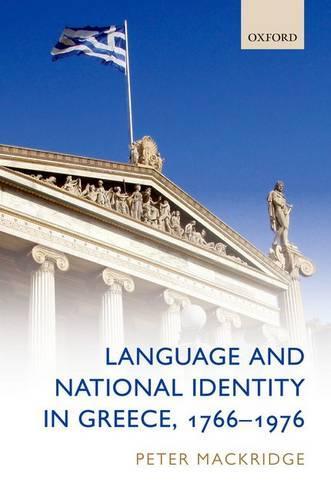Full Product Details
Author: Peter Mackridge (Emeritus Professor of Modern Greek, Oxford)
Publisher: Oxford University Press
Imprint: Oxford University Press
Dimensions:
Width: 15.60cm
, Height: 2.30cm
, Length: 23.30cm
Weight: 0.620kg
ISBN: 9780199599059
ISBN 10: 019959905
Pages: 402
Publication Date: 18 November 2010
Audience:
College/higher education
,
Postgraduate, Research & Scholarly
Format: Paperback
Publisher's Status: Active
Availability: To order

Stock availability from the supplier is unknown. We will order it for you and ship this item to you once it is received by us.
Reviews
`Review from previous edition There can be little doubt that this work is a major contribution to the cultural history of Greece. Peter Mackridge has written a book that is authoritative, hugely informative, an inexhaustible source of useful detail and sound judgement, that makes complete and fair use of all available literature on an important and controversial subject. For all this we should be grateful.' Paschalis M. Kitromilides `This book provides the first authoritative, nuanced, and analytical account of the notorious language question in modern Greece. Drawing copiously on original sources that have often been overlooked, even by specialists, Mackridge coherently and convincingly explains why the correct form of their national language mattered so much to Greek-speakers for more than two centuries. In doing so he also argues powerfully for the role of language to be better studied as part of the global phenomenon of nation-formation.' Roderick Beaton `Modern Greek, a more extraordinary language even than English, reaches back to Homer, Sophocles, Plato, and Sappho. For Greeks, the demotic language of today is part of a three-thousand-year continuum that buoys their sense of pride and identity. What a joy it is to fashion our language! says Kazantzakis. Peter Mackridge's incisive examination shows why.' Peter Bien `Despite its methodological foundation in linguistics and social sciences, the study has a great scholarly accomplishment that is basically historical...Peter Mackridge's book should be read by all students in all the social sciences.' Anna Frangoudaki, The Athens Review of Books
Mackridge has absorbed [such] recent work not only in linguistics but also history and cultural studies and it informs his new book, which is the fruit of a whole career pondering the language. It is probably the most comprehensive and authoritative account of the development of the Greek language (or languages) since the late 18th century. Michael Llewellyn Smith, Anglo-Hellenic Review
Author Information
Peter Mackridge is Emeritus Professor of Modern Greek at Oxford, where he taught modern Greek language, literature, and culture from 1981, and Visiting Professor of Modern Greek at King's College London. He is the author of The Modern Greek Language (OUP 1985), and co-author of Greek: a Comprehensive Grammar of the Modern Language (Routledge 1997)) and Greek: an Essential Grammar of the Modern Language (Routledge 2004) all of which have been published in Greek.




